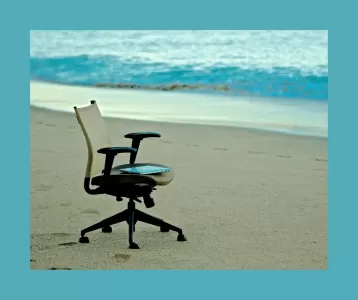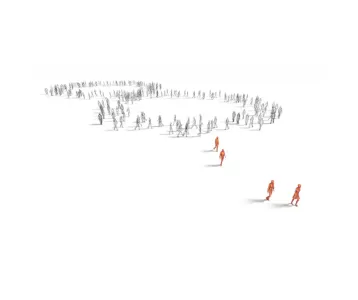Why Am I Invisible at Work?
The air was quiet, calm, and peaceful. Maybe it was because of the 30-degree temperature or being a Sunday morning that others chose to stay indoors and leave the trail for me alone.
As I continued, the rumble of the rapids grew. I could see the gurgling, roiling water being backlit by the sun, creating a shimmery, sparkly kind of mist as I approached. The sound grew loud as the volume of the water in the creek transformed around and over submerged rocks and under fallen trees. Icicles hung shimmering in the morning light. What power, what grace. I was struck by the beauty of this force and churn of the falls.
Then my thoughts shifted to thinking this moment was perfect for a particular someone not with me. I envisioned their delight, and my delight in their joy. I was thinking this was a moment for them. This moment, as I was thinking about it, was not about how it moved me. It was a moment being retained for someone not there.
Does this sound familiar? Does this happen when you go out for dinner and take a picture of your meal? Is the picture for your benefit or for someone else?
Perpetual People Pleasers, like us, often neglect ourselves. It’s not wrong to want to share the waterfall or the dinner, but it’s the missed opportunity to experience our own feelings. Our lives become descriptions about activities and experiences as expressed by or for someone else. Over time, what is lost is us.
This is one way taking care of others teaches us to suppress or ignore our own feelings, and in time, leaves us feeling hollow, empty, and lost. Because of this, we lose resiliency and struggle more than others with unexpected changes because what others say, and think, are our guides.
This happens at work as well. The test is to consider how much of your approach to work comes from directions given to you or are dependent upon those who know more. This is expected when beginning a new role, but has it continued? This is the nuance.
I am speaking to those experienced in their current role who still defer to others for direction. You do not feel you have a say in what or how you do your job. Yet you are uncertain about an alternative.
Consider this exercise: All managers and subject matter experts have been taken to an offsite meeting and are not available for the rest of the month at all. Your deadlines, however, remain. What is your reaction? Is your first thought, this can’t be done because the brains of the operation are gone? Are you ready to make decisions, to complete your tasks sufficient to keep clients and suppliers satisfied and revenue coming to the company? What would you do different?
Those doing their job dependent upon others or those comfortable having smarter people be their safety net are setting themselves on a path of invisibility and disappointment. The adjustment is to shift your thinking and address tasks as if this is your company, the tasks you are to perform are your responsibility. Owning the task means you will demand the support necessary to deliver the quality to your standards. You work to satisfy your standards. A level for which you will be proud. If you need the support from a manager or another department, you hold your task as a priority and push for what you need. You make others tell you something else is of greater importance. If you agree with that answer, you accept it. If you don’t, you seek alternative solutions. You are the person making the decision about your task because it has become your task and your responsibility. You are no longer just the person following orders. Shifting your approach in this way will help you thrive during changing times and be seen as a contributor at work.
Paying attention to your feelings is necessary for you to know when you are going through the motions at work and when you are fully owning your responsibilities. This is what will give you a sense of control and confidence which will also allow you to move on more easily to other jobs and other companies as the opportunities arise.
I left the trail that day with a beautiful moment for me. It now exists, not as a post card to share with that someone, but as my joy in having witnessed the wonder of nature. I share my joy, what I felt.
Adjusting your tendency to take care of others and only follow direction can be a challenging change because it is moving you away from what you know. Working with a coach is a way to get the support that is helpful in changing your dynamics at the office.
Accountability Coaching supports people who seek this kind of change faster than you can on your own. Results can be seen in as short as three months. Fill out the contact form to have a free conversation with me to see if Accountability Coaching is right for you.









